完整word版必修三Unit3TheMillionPoundBankNote知识点归纳
人教高中英语必修3 Unit3 The million pound bank note[Readin
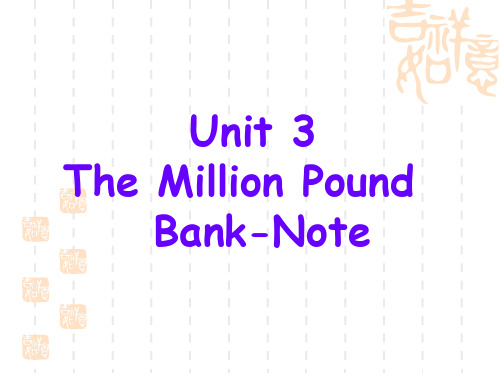
3. Why did he land in Britain?
He was sailing out the bay when he was carried out to sea by a strong wind and was survived by a ship for London.
4.What happened to Henry after he met the two brothers? He was given a letter by the two brothers and was asked not to open it until two o’clock.
good at writing about children’s adventures
his masterpieces
The Adventures of Tom Sawyer
(汤姆·索亚历险记)
1876
his masterpieces
The Adventures of Huckleberry Finn
Unit 3 The Million Pound
Bank-Note
Mark Twain
(1835—1910)
How much do you know about him?
The greatest humorist of the 19th century in American literature. Also one of the greatest writer in the world.
Enjoy the film!
Read the play with emotion.
Try to act it out.
It is my first trip here. Well, to be honest, I have none. (no money) Well, I can’t say that I have any plans.
2019届高考一轮讲义:必修3 Unit 3 The Million Pound Bank Note(含答案)
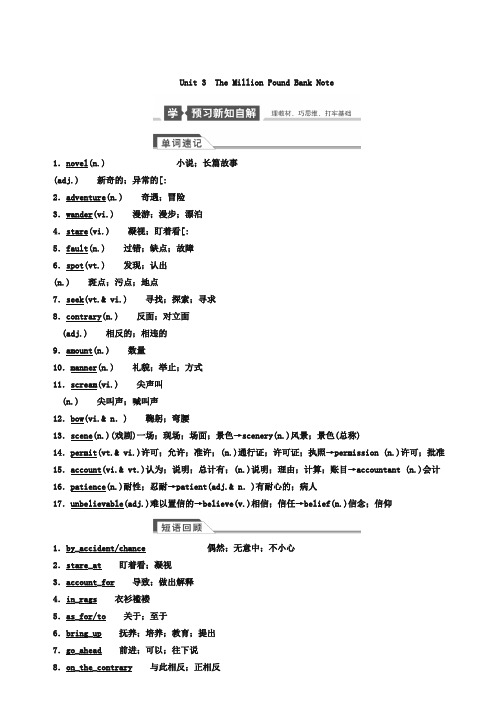
Unit 3 The Million Pound Bank Note1.novel(n.) 小说;长篇故事(adj.) 新奇的;异常的[:2.adventure(n.) 奇遇;冒险3.wander(vi.) 漫游;漫步;漂泊4.stare(vi.) 凝视;盯着看[:5.fault(n.) 过错;缺点;故障6.spot(vt.) 发现;认出(n.) 斑点;污点;地点7.seek(vt.& vi.) 寻找;探索;寻求8.contrary(n.) 反面;对立面(adj.) 相反的;相违的9.amount(n.) 数量10.manner(n.) 礼貌;举止;方式11.scream(vi.) 尖声叫(n.) 尖叫声;喊叫声12.bow(vi.& n.) 鞠躬;弯腰13.scene(n.)(戏剧)一场;现场;场面;景色→scenery(n.)风景;景色(总称)14.permit(vt.& vi.)许可;允许;准许;(n.)通行证;许可证;执照→permission (n.)许可;批准15.account(vi.& vt.)认为;说明;总计有;(n.)说明;理由;计算;账目→accountant (n.)会计16.patience(n.)耐性;忍耐→patient(adj.& n.)有耐心的;病人17.unbelievable(adj.)难以置信的→believe(v.)相信;信任→belief(n.)信念;信仰1.by_accident/chance 偶然;无意中;不小心2.stare_at 盯着看;凝视3.account_for 导致;做出解释4.in_rags 衣衫褴褛5.as_for/to 关于;至于6.bring_up 抚养;培养;教育;提出7.go_ahead 前进;可以;往下说8.on_the_contrary 与此相反;正相反9.to_be_honest 说实话10.take_a_chance 冒险11.from_the_bottom_of_one’s_heart 从心底12.take_one’s_order 点菜1.Well,towards nightfall I found myself carried out to sea by a strong wind.嗯,傍晚时分我发现自己被一阵大风刮到海上去了。
高中英语必修三unit3课时练习(word版附答案)

精品好资料——————学习推荐U nit3TheMillionPoundBankNoteI.单词拼写Period11.Stop talking, Henry! I don’t have the pto hear suchan empty talk.2.Theirshipsank into the bottomof the sea.Fortunately,theyweres_bya ship and rescued..3.I got caught inthe trafficjam, so Imissedthe firstsofthe play.4.The billwould pworkers 12weeks of unpaidleave for family emergencies.5.Youwereat(过错).You didn’t account for thereason toyour teacherin time.6.Tomcame to thecity in the1970sto(寻找) his fortune.7.The child was last seen(漫游) in thestreetwith a bagon his back.8.The children are listening tohis_(冒险) storiesinAfrica with great attention.9.She was(盯) atthe passers-by withoutany expression.10.I havereadseveral(小说) writtenbyMarkTwain, a famousAmericanauthor.II.用方框中所给短语的正确形式填空。
1.My carbroke down halfway,whichmy being latefor themeeting.2.----I’msureyou likeyour new job.----,it’s dull.3.Let’s on whowillwin therace at last.4.---- Do youmindmyclosingthe window?It is a bitcold here.----Yes, I do,.5.Thoughin a big city,the boy likes beingclose to natureand animals.6.Itis already midnight,butmyfather is stillsitting in thearmchair,the floorsilently.7.It was obvious that he set offthe bomb.8.I happened tobewhenthe accident happened.9.---- Wouldyou mind if I turned on theradioandturnedtosomemusic?----No,. Infact, Ialsoliketolistentomusic in my car.精品好资料——————学习推荐10.ThenovelFrance inthe early 1880s.III.单句语法填空。
新人教版 Book 3 Unit 3 The Million Pound Bank Note 课文教程文件
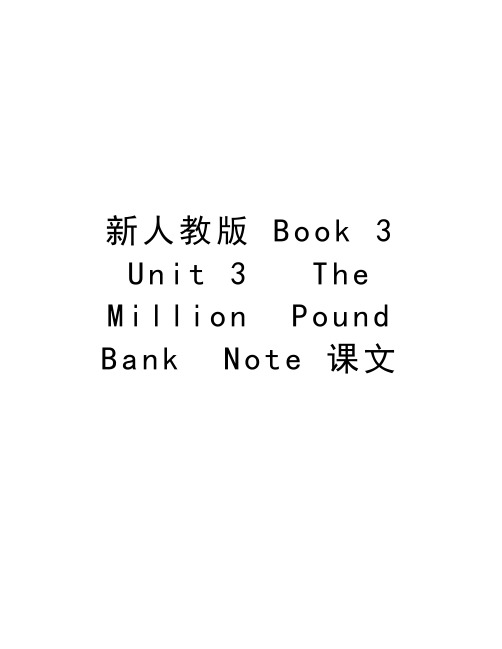
新人教版B o o k3 U n i t3T h e M i l l i o n P o u n d B a n k N o t e课文Book 3 Unit 3 The Million Pound Bank NoteAct I, Scene 3NARRATOR:It is the summer of 1903, Two old and wealthy brothers, Roderick and Oliver, have made a bet. Oliver believes that with a billion pound banknote a man could survive a month in London. His brother Roderickdoubt s it. At this moment, they see a penniless young man wander ing onthe pavement outside their house. It is Henry Adams, an Americanbusinessman, who is lost in London and does not know what he shoulddo.RODERICK:Young man, would you step inside a moment, please?HENRY: Who? Me, sir?RODERICK:Yes, you.OLIVER:Through the front door on your left.HENRY: (a servant opens a door) Thanks.SERVANT: Good morning, sir, would you please come in? Permit me to lead the way, sir.OLIVER: (Henry enter s) Thank you, James. That will be all.RODERICK:How do you do, Mr…er…?HENRY: Adams, Henry Adams.OLIVER: Come and sit down, Mr Adams.HENRY: Thank you.RODERICK:You’re an American?HENRY:That’s right, from San Francisco.RODERICK:How well do you know London?HENRY:Not at all. It’s my first trip here.RODERICK:I wonder, Mr Adams, if you’d mind us asking a few questions. HENRY: Not at all. Go right ahead.RODERICK:May we ask what you’re doing in this country and what your plans are? HENRY:Well, I can’t say that I have any plans. I’m hoping to find work. As a matter of fact, I land ed in Britain by accident.OLIVER: How is that possible?HENRY: Well, you see, back home I had my own boat. About a month ago I was sail ing out of the bay…(his eyes stare at what is left of the brother’sdinner on the table)RODERICK:Well, go on.HENRY: Oh, yes. Well, towards nightfall I found myself carried out to sea by a strong wind. It was all my fault. I did not know whether I could surviveuntil morning. The next morning I’d just about given myself up for lostwhen I was spot ted by a ship.OLIVER: And it was the ship that brought you to England.HENRY: Yes. The fact is that I earn ed my passage by working as an unpaid hand, which account s for my appearance. I went to the American embassy toseek help, but …(the brothers smile at each other)RODERICK:Well, you mustn’t worry about that. It’s an advantage.HENRY:I’m afraid I don’t quite follow you, sir.RODERICK:Tell us, Mr Adams, what sort of work did you do in America?HENRY: I worked for a mining company. Could you offer me some kind of work here?RODERICK:Patience, Mr Adams. If you don’t mind, may I ask you how much money you have?HENRY: Well, to be honest, I have none.OLIVER: (happily) What luck! Brother, what luck! (clap s his hands together) HENRY: Well, it may seem lucky to you but not to me. On the contrary, in fact. If this is your idea of some kind of joke, I don’t think it’s very funny. (Henrystands up to leave) Now, if you’ll excuse me, I think I’ll be on my way. RODERICK:Please don’t go, Mr Adams.You mustn’t think we don’t care about you.Oliver, give him the letter.OLIVER: Yes, the letter. (gets it from a desk and gives it to Henry like a gift) The letter.HENRY: (taking it carefully) For me?RODERICK:For you. (Henry starts to open it) Oh, no, you mustn’t open it. Not yet.You ca n’t open it until two o’clock.HENRY: Oh, this is silly.RODERICK:Not silly. There’s money in it. (calls to the servant) James.HENRY:Oh, no, I don’t want your charity. I just want an honest job.RODERICK:We know you’re hard-working. That’s why we’ve given you the letter.James, show Mr Adams out.OLIVER: Good luck, Mr Adams.HENRY: Well, why don’t you explain what this is all about?RODERICK:You’ll soon know. (looks at the clock) In exactly an hour and a half. SERVANT: This way, sir.RODERICK:Mr Adams, not until 2 o’clock. Promise?HENRY: Promise. Good-bye.Act I, Scene 4(Outside a restaurant Henry looks at the envelope without opening it and decide s togo in. He sits down at a table next to the front window.)OWNER: (seeing Henry’s poor appearance) That one’s reserve d. This way, please.(to the waiter) take this gentleman’s order, Horace.HENRY: (after sitting down and putting the letter on the table) I’d like some ham and eggs and a nice big steak. And make it extra thick. I’d also like acup of coffee and a pineapple dessert.WAITER: Right, sir. I’m afraid it’ll cost a large amount of money.HENRY: I understand. And I’ll have a large glass of beer.WAITER: OK. ( the waiter leaves and soon returns with all the food)HOSTESS:My goodness! Why, look at him. He eats like a wolf.OWNER: We’ll see if he’s clever as a wolf, eh?HENRY: (having just finished every bit of food) Ah, waiter. (waiter returns) same thing again, please. Oh, and another beer.WAITER: Again, everything?HENRY: Yes, that’s right. (sees the look on the waiter’s face) Anything wrong? WAITER: No, Not at all. (to the restaurant owner) He’s asked for more of the same.OWNER: Well, it is well-known that Americans like to eat a lot. Well, we’ll have to take a chance. Go ahead and let him have it.WAITER: (reading the bill after the meal) All right. That’s two orders of ham and eggs, two extra thick steaks, two large glasses of beer, two cups of coffeeand two desserts.HENRY: (looking at the clock on the wall) would you mind waiting just a few minutes?WAITER: (in a rude manner) What’s there to wait for?OWNER: All right, Horace, I’ll take care of this.HENRY: (to owner) That was a wonderful meal. It’s amazing how much pleasure you get out of the simple things in life, especially if you can’t have them for awhile.OWNER: Yes, very interesting. Now perhaps, sir, if you pay your bill I can help the other customers.HENRY: (looking at the clock on the wall again) Well, I see it’s two o’clock. (he opens the envelope and hold s a million pound bank note in his hands.Henry is surprised but the owner and the waiter are shocked) I’m very sorry.But … I … I don’t have anything smaller.OWNER: (still shocked and nervous) Well, er … just one moment. Maggie, look!(the hostess scream s, the other customers look at her and she puts ahand to her mouth). Do you think it’s genuine?HOSTESS:Oh, dear, I don’t know. I simply don’t know.OWNER: Well, I did hear that the Bank of England had issue d two notes in thisamount …Anyway, I don’t think it can be a fake. People would pay toomuch attention to a bank note of this amount. No thief would want that tohappen.HOSTESS: But he’s in rag s.OWNER:Perhaps he’s a very strange, rich man. (as if he has discover edsomething for the first time) Why, yes! That must be it!HOSTESS: (hit s her husband’s arm) And you put him in the back of the restaurant!Go and see him at once!OWNER:(to Henry) I’m so sorry, sir, so sorry, but I cannot change this bank note. HENRY:But it’s all I have on me.OWNER:Oh, please, don’t worry, sir. Doesn’t matter at all. We are so glad that you even entered our little eating place. Indeed, sir, I hope you’ll come herewhenever you like.HENRY:Well, that’s very kind of you.OWNER:Kind, sir? No, it’s kind of you, sir. You must come whenever you want and have whatever you like. Just having you sit here is a great honour! As forthe bill, sir, please forget it.HENRY:Forget it? Well … thank you very much. That’s very nice of you. OWNER:Oh, it’s for us to thank you, sir and I do, sir, from the bottom of my heart.(the owner, hostess and waiter all bow as Henry leaves)。
必修三第三单元课文及翻译.doc

Unit 3百万英镑THE MILLION POUND BANK NOTEAct I, Scene 3第一幕第3场NARRATOR:旁白:It is the summer of 1903.1903年的夏天。
Two old and wealthy brothers, Roderick and Oliver, have made a bet.一对年老又富有的兄弟,罗德里克和奥利弗,打了一个赌。
Oliver believes that with a million pound bank note奥利弗认为,一个人靠一张百万英镑的钞票a man could survive a month in London.在伦敦能活一个月。
His brother Roderick doubts it.他的兄弟罗德里克对此表示怀疑。
At this moment, they see a penniless young man wandering on the pavement outside their house.这时,他们看见一个身无分文的年轻人在房子外面的人行道上游荡。
It is Henry Adams, an American businessman,他叫亨利•亚当斯,一个美国商人。
who is lost in London and does not know what he should do.他在伦敦迷了路,不知道该怎么办。
RODERICK: Young man, would you step inside a moment, please?罗德里克:年轻人,请你进来一下好吗?HENRY: Who? Me, sir?亨利:先生,你叫谁呀?是叫我吗?RODERICK: Yes, you.罗德里克:是的,就是你。
OLIVER: Through the front door on your left.奥利弗:从你左侧的前门进来。
Unit 3 The Million Pound Bank Note

Unit 3 The Million Pound Bank Note Unit3ThemillionPoundBankNote核心单词.scenen.现场;情景;景色;发生地点;(戏剧)一场ourreporterwasthefirstpersononthescene.我们的记者是最先到达出事地点的。
Isawthescenewithmyowneyes.我亲眼目睹了那一幕。
Therockingboatsalongtheriverbankmakeabeautifulscene.河边晃晃悠悠的船只构成了一道美丽的风景。
易混辨析scene/scenery/sight/viewscene指某一处的自然风光;情形,情景。
scenery(总称)自然景物,天然风光,是由多个scenes 构成的自然风景。
sight景象,风景,名胜,侧重指值得看的事物或很难看的东西;很可笑的事物。
view景色,风景,侧重指从人所处的角度用肉眼所看到的景色。
高手过招单项填空Seeingthehappyofthechildrenplayinginthepark,I’mfullofjoyandconfidenceinthefutureofourcountry.A.SightB.viewc.lookD.scene选词填空(原创)①Guilinisfamousforitsbeautiful.②Theisaperfectdreamwhenyouseethesunrisingslowlyintheeas t.③youcangetawonderfulatthetopofthetower.④Theflowersarealovelyinspring.⑤Hebegantolosehissixyearsago.解析:选D。
句意为:看到孩子们在公园里玩耍的幸福一幕,我对我们国家的未来充满了自信和喜悦。
scene表示包括人及其活动的“景色”。
①scenery②scene③view④sight⑤sight2.permitvt.&vi.许可;允许;准许n.通行证;许可证;执照Hishealthdoesn’tpermithistravellingwithus.他的健康状况不允许他同我们一起旅行。
人教版高中英语必修三Unit 3《The Million Pound Bank Note》word单元教案
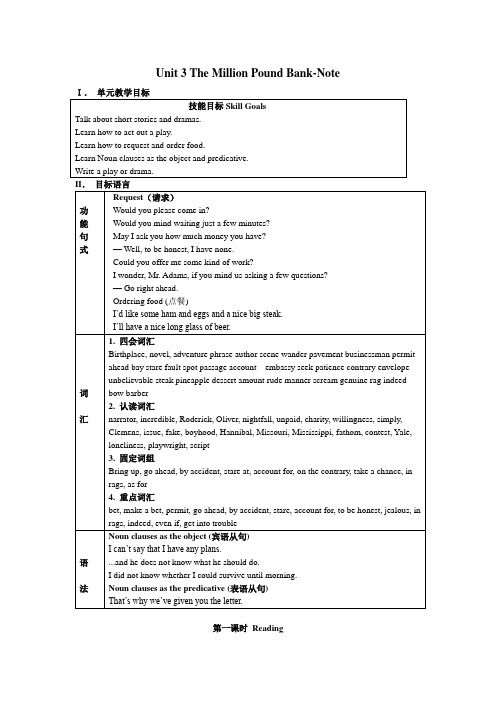
Unit 3 The Million Pound Bank-Note第一课时ReadingTeaching goals 教学目标1. Target language 目标语言a. 重点词汇和短语bet, make a bet, permit, go ahead, by accident, stare, account for, to be honest, jealousb. 交际用语Expressions on request:Would you step inside a moment, please?Would you please come in?May we ask what you’re doing in this country and what your plans are?Well, why don’t you explain what this is all about?c. 重点句型2. Ability goals能力目标a. Enable students to read and hear natural language in a dramatic context and increase their self-confidence in using English, which will increase their overall motivation to learn English.b. Enable students to sum up the main idea of ACT ONE Scene 3.c. Enable students to understand the details about the whole scene.d. Retell the scene using the key words of the whole scene.e. Express their opinions by answering the following questions:1) Do you think money is everything? Why?2) Do you agree that only money can bring people happiness?3. Learning ability goals 学能目标a. Help students to understand natural language in the dramatic context and increase their self-confidence in using English.b. Help students to sum up the main idea of ACT ONE Scene3.c. Help students to understand the details of the whole scene.d. Get students to retell the whole scene.e. Help them to answer the following questions:1) Do you think money is everything?2) Do you agree that only money can bring people happiness?Teaching important points 教学重点a. How to interpret language through tone of voice and body language, gaining a greater appreciation of the various verbal and non-verbal ways in which language works.b. Discuss the questions:1) Do you think money is everything?2) Do you agree that only money can bring people happiness?Teaching difficult points教学难点Discuss the questions:1) Do you think money is everything?2) Do you agree that only money can bring people happiness?Teaching methods 教学方法Elicitation, discussion, listening, reading and pair work.Teaching aids 教具准备A computer, a projector and a tape recorder.Teaching procedures and ways教学过程与方式Warming up-IWhat do you know about Mark Twain? Do you know any of his works?greatest humorist of the 19th century American literature.Novels:The Adventures of Tom Sawyer (1876)(汤姆·索亚历险记)The Prince and the Pauper (1882)(皇子与贫儿)The Adventures of Huckleberry Finn (1894)(哈克贝利·费恩历险记)DiscussionSuppose a rich person gives you a million pound bank-note, what will you do with it ? Give the reasons.Introduce some new words to the students:incredible: difficult to believe (unbelievable)stare at: look at sb. / sth. for a long timenightfall: the time in the evening when it becomes darksurvive: continue to live or existspot: see or notice a person or thingaccount for: to be the explanation or cause of sth.charity: 施舍by accident: by chancePre-reading1. First, give students a brief introduction of the storyTwo rich gentlemen made a bet on what would happen to a person if he was given a million poundHenry, the hero of the story, an American young man, sailed too far, drifted out to the ocean. A British ship, for London, passing by, fortunately saved him.2. Prediction :What would happen to Henry?ReadingScan the passage and find out :What happened to Henry?What does the brothers choose Henry for?What happened to Henry?He was given a letter by the two brothers and was asked not to open it until two o’clock.What does the brothers choose Henry for?They wanted to make a bet on Henry.Skimming: answer the following questions:1. Where does Henry Adams come from? Does he know much about London?2. What did he do in America?3. Why did he land in Britain?Put the following events in correct order.(1) Henry wandered in London streets.(2) About a month ago Henry Adams was sailing out of the bay.(3) The next morning he was spotted by a ship.(4) Towards nightfall he found himself carried out to sea by a strong wind.(5) On the ship he earned his passage by working as an unpaid hand.Keys;(2) About a month ago Henry Adams was sailing out of the bay.(4) Towards nightfall he found himself carried out to sea by a strong wind.(3) The next morning he was spotted by a ship.(5) On the ship he earned his passage by working as an unpaid hand.(1)Henry wandered in London streets.After-readingWhat kind of persons you think the characters are? (Henry Adams, Oliver Roderick)The second period1. First. Introduce some new words:steak:eat like a wolf:genuine:reserve:fake:bow:2. CULTURAL NOTE: Henry asks for a steak “extra thick” for his meal. InChina, steak is generally cut thinly but in America it is appreciated if it is cut thickly and grilled or fried. The advantage of having a ste ak “extra thick” is that it can be well cooked on the outside but still raw or half raw in the center.3. Read and answer these questions:1. What was it in the letter?2. Before Henry took the note out of the envelope, did the waiter serve him politely? Why?3. Did the owner believe that the note was genuine or not? Why?4. Whose behavior changes the most during this scene?5. What kind of person is the owner of the restaurant?6. Why do you think the owner of the restaurant gave Henry a free meal?4. Detailedr reading1. What does “it’ll cost a large amount of money” exactly mean?2. At the sight of the customer’s note, the owner and his waiter got very _D_.A. frightenedB. angryC. worriedD. excited3. When did the hostess and the waiter change their attitude to the customer? _____D____A. At the beginning of the story.B. Before they saw the large note.C. At the end of the story.D. After they saw the large note.In group o f four, play the parts of “Henry, waiter, owner and hostess”.The third period GrammarThe Second Period GrammarTeaching goals 教学目标1. Target language 目标语言a. 重点词汇和短语win the bet, make the bet, be worried about, stay out of jail, a poorly-dressed gentleman, eat like a wolf, be a big puzzle to sbb. 重点句子May we ask what you are doing in this country?Well, why don’t you explain what this is all about?That’s why we’ve given you the letter.We were very surprised that he finished two orders of food in a very limited time.We doubted whether the man was able to pay for the food.2. Ability goals 能力目标a. Enable the students to use the words and expressions in this part.b. Enable students to understand and use noun clauses as the object and predicative.3. Learning ability goals 学能目标a. Get the students to guess the meaning of the words or expressions according to the context.b. Get the students to use the noun clauses as the object and predicative.Teaching important points 教学重点a. How to make students understand and use noun clauses as object and predicative.b. Get the students to master the usage of the important words of this unit.Teaching difficult points教学难点How to make students understand and use noun clauses as object and predicative.Teaching methods 教学方法Task-based methodTeaching aids 教具准备A computer and a projectorTeaching procedures and ways教学过程与方式1. 名词性从句是由if, whether, that和各种疑问句词where, when等充当连接词所引导的从句, 其功能同名词一样。
高中英语(必修三) Unit 3 The Million Pound Bank Note Unit 3 Period One 含答案
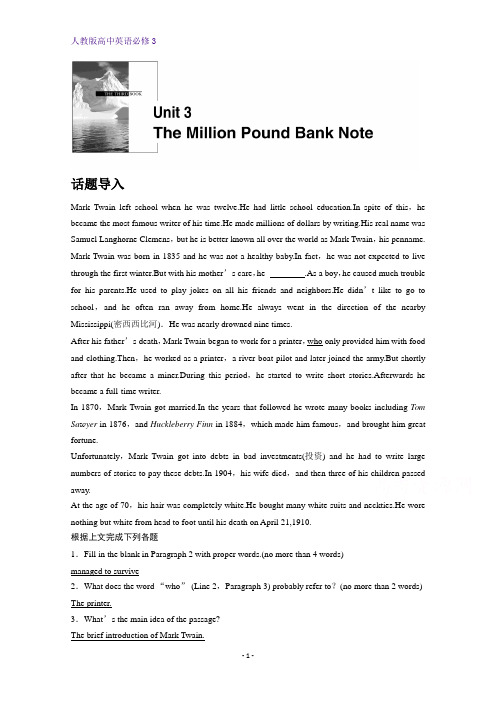
话题导入Mark Twain left school when he was twelve.He had little school education.In spite of this,he became the most famous writer of his time.He made millions of dollars by writing.His real name was Samuel Langhorne Clemens,but he is better known all over the world as Mark Twain,his penname. Mark Twain was born in 1835 and he was not a healthy baby.In fact,he was not expected to live through the first winter.But with his mother’s care,he .As a boy,he caused much trouble for his parents.He used to play jokes on all his friends and neighbors.He didn’t like to go to school,and he often ran away from home.He always went in the direction of the nearby Mississippi(密西西比河).He was nearly drowned nine times.After his father’s death,Mark Twain began to work for a printer,who only provided him with food and clothing.Then,he worked as a printer,a river-boat pilot and later joined the army.But shortly after that he became a miner.During this period,he started to write short stories.Afterwards he became a full-time writer.In 1870,Mark Twain got married.In the years that followed he wrote many books including Tom Sa w yer in 1876,and Huckleberry Finn in 1884,which made him famous,and brought him great fortune.Unfortunately,Mark Twain got into debts in bad investments(投资) and he had to write large numbers of stories to pay these debts.In 1904,his wife died,and then three of his children passed away.At the age of 70,his hair was completely white.He bought many white suits and neckties.He wore nothing but white from head to foot until his death on April 21,1910.根据上文完成下列各题1.Fill in the blank in Paragraph 2 with proper words.(no more than 4 words)managed to survive2.What does the word “who” (Line 2,Paragraph 3) probably refer to?(no more than 2 words) The printer.3.What’s the main idea of the passage?The brief introduction of Mark Twain.Period One Warming Up & ReadingⅠ.单词1.v.wander漫步;漫游permit允许;准许stare凝视spot发现;认出seek寻找;探索2.n.birthplace出生地adventure奇遇;冒险phrase词组author作家scene场景;场面pavement人行道fault过错;缺点passage船费;通道embassy大使馆patience耐性;忍耐envelop信封3.adj.contrary相反的unpaid未付款的novel新奇的;异常的Ⅱ.短语1.抚养;培养bring up2.打赌make a bet3.前进go ahead4.偶然by accident5.盯着看stare at6.导致;做出解释account for7.与此相反;正相反on the contrary1.It is Henry Adams,an American businessman,who is lost in London and does not know what he should do.他叫亨利·亚当斯,一个美国商人,在伦敦迷了路,不知道该怎么办。
- 1、下载文档前请自行甄别文档内容的完整性,平台不提供额外的编辑、内容补充、找答案等附加服务。
- 2、"仅部分预览"的文档,不可在线预览部分如存在完整性等问题,可反馈申请退款(可完整预览的文档不适用该条件!)。
- 3、如文档侵犯您的权益,请联系客服反馈,我们会尽快为您处理(人工客服工作时间:9:00-18:30)。
The Million Pound Bank Note 知识点归纳 I. 重点短语(1) permit doing sth. (2) permit sb.to dosth. 与 permit 具有相同用法的单词还有:doing sth.allow/forbid/advise + 允许 /禁止 /建议 (某人 )做某事sb. to do sth.sth./sb.doing (1) spotthat ...发现 ... 发现某物/某人做 ....(2) be spotted with 散布;点缀着 ....(3) on the spot 当场;在现场(1) account for 解释;说明(2) on account of 由于;因为on no account 决不 (置于句首时,句子用部分倒装 )on any account 无论如何(3) take ...i nto acco unt = take ...i nto con sideratio n 考虑(4) open an account 开设账户4. make a bet 打赌 就某事打赌I bet that ...我敢说make a bet with sb. 与 打赌make a bet on sth. 就某事打赌5. bring up 培养;抚养;教育;提出;呕吐bring about 引起;产生;导致;带来bring sth.back 带回某物;使想起bring dow n 让 .... 降下来;使倒下bring in 引入6. go ahead 前进; (用于祈使句 )可以;往下说7. take a chance 冒险;试图做某事;碰运气(1) take a cha nee = take on e's cha nce/take cha nee 冒险(2) by chanee 匕 by accident)偶然;碰巧(3) The cha nces are that-可能 ....必修 3 Unit 3允许做某事 允许某人做某事1.2. bet on sth.There is a cha nee that •可能...II.重点句型1.find+宾语+宾语补足语Well, towards nightfall I foundmyself camed out to sea(发觉自己被刮到海里去了) by a str ong wi nd.2.并列连词when引导的从句The next morni ng rd just about give n myself up for lostwhen_J_was _spotted_by a_ship这时一艘船发现了我).3•强调句型And it was the ship that (正是那艘船)brought you to England.4.主语从句lt.is well- known that (众所周知)America ns like to eat a lot.5.wh-ever引导的让步状语从句In deed, sir, I hop e you'll come herewhe never you like (您想来的时候就来).6.I wonder if you ...不知道你是否...... ”常用来提出疑问或请求。
I wonder if you'd mind us asking a few questions亚当斯先生,我们问几个问题不知道你是否介意。
7.............................................................................................................. The fact is that ..., which accounts for ... 事实上是............................. ,这说明.... ”。
The fact is that I earned my p assage by work ing as an unp aid hand, which acco unts for my app eara nee.8.It is well- known that ...众所周知.... ”。
Well, it is well- known that America ns like to eat a lot.III.词形变化1.scene n.(戏居U)—场;现场;场面;景色f seenery n.风景;景色(总称)2.permit vt.& vi.许可;允许;准许n.通行证;许可证;执照f permission n.许可;批准3.accountvi.& vt.认为;说明;总计有n.说明;理由;计算;账目f accountant n.会计4.Patienee n.耐性;忍耐f patient adj.有耐心的n.病人f patiently adv耐心地5.unbelievable adj.难以置信的_believable adj.可以相信的unbelievably adv.难以置信地f believe v.相信;信任f belief n.信念;信仰6.novel n.小说adj.新奇的;异常的 novelist n.小说家7.adventuren.奇遇;冒险adventurous adj.爱冒险的;充满危险的adventurern.冒险家;投机分子8. rudeadj.粗鲁的;无礼的rudely adv.粗鲁地rudeness n.粗鲁;无礼Quiz (必修 3 Unit 3 The Million Pound Bank Note )、用所给单词的适当形式填空1. Fin ally he lost his patience (p atie nt) and started to yell at his mother.2. It would be unbelievable (believe) that such an honest fellow should have betrayed his frien ds.3. 8. Black.9. Children are always curious about everything they see and hear.They will ask all kinds of questions curiously.To meet their curiosity,_we'd better answer them.(curiosity)10. David has a strong body.He has the strength to do this hard work.We had better strengthen the relationship between us.(strength)11. This new railway ben efits this area in many ways 」t is ben eficial to the people livi ng in this area.For the benefit of more people, we should build more railways.(be nefit)二、完成句子1. — Do you both agree with me about the arran geme nt of the meet ing? My husba nd loves adventurous (adve nture) life while I enjoy a more p eaceful life. He was puni shed for his rudeness (rude) to his teacher. I think it's time we sought (seek) legal advice. They en tered the area without permissio n (p ermit) Sto p screaming (scream), we can hear you clearly.“I'm just an ordin arjousinessman (bus in ess), tryi ng to earn an hon est pen ny ” saidMr. 4. 5. 6. 7.—He quite agrees with you. As for me 至于我),I am not so satisfied with it.2. — May I open the window to let in some fresh air?—Go_ahead,_please 请开吧).3. The job helped him make an amount of 大量的)money.4. Mark Twain wasbrought up (抚养长大)in Missouri in the middle part of the United States.5. When he grew up, he took a_chanee 冒险)to work as a pilot on a river boat.6. After_ seeking_advice _from_his_father 在征求了父亲的建议后 ),he decided to become a writer.7. Many of his novels have been translated into many Ianguages, which accounts_fc 解释) the reas on why he and his works are dee ply loved by readers throughout the world.8. It was n't a good thing; on the contrary 相 反),it was a huge mistake.m .根据汉语提示,选用练习n 中的句子,加入适当过渡词后联句成篇马克 吐温在美国中部的Missouri 长大,他是美国19世纪著名的作家之一。
成年后,他冒险在密西西比河的船上当水手,而起初父亲并不同意。
在征求了父亲的建议后,他决定当一名作家。
这一职业使他赚了钱。
他的作品被译成多种语言,这就解释了全世界读者喜爱他和他的作品的原因。
